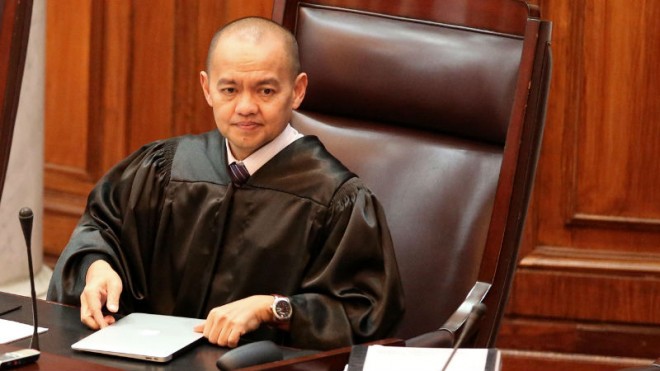Associate Justice Marvic Leonen on Tuesday suggested that the solution to the problem created by President Duterte’s withdrawal of the Philippines from the Rome Statute, the founding treaty of the International Criminal Court (ICC), could be political rather than legal.
The next President can reinstate the Philippines as a party to the treaty, Leonen said during oral arguments called by the Supreme Court to tackle a petition brought by the Philippine Coalition for the International Criminal Court (PCICC) asking the tribunal to recall Mr. Duterte’s withdrawal order.
Opposition senators also challenged Mr. Duterte’s order, which takes effect in March 2019, saying it was illegal as the order had no approval of the Senate, the country’s treaty-ratifying body.
But senators Francis Pangilinan, Franklin Drilon, Paolo Benigno Aquino IV, Antonio Trillanes IV and Risa Hontiveros did not show up for the oral arguments because the Supreme Court had turned down their request that Sen. Leila de Lima, who is detained on drug trading charges, argue their position, either before the tribunal or by video conference from her cell.
A lawyer sent by the senators told the court that the legislators had yet to decide who would represent them in the next round of arguments.
Legal standing
Leonen, who would write the decision for the full court after the arguments, questioned the legal status of the PCICC, headed by former Human Rights Commissioner Etta Rosales, in seeking to overturn Mr. Duterte’s order, saying the group had not experienced any threat as a result of the withdrawal.
“It’s either you are premature or too late,” Leonen told Ray Paolo Santiago, one of the three lawyers for the PCICC.
Leonen said the Supreme Court, if it ruled in favor of the petitioners, might be accused of deciding a political issue, as withdrawal from the treaty was an “offshoot” of Mr. Duterte’s exercise of his prerogative to conduct the country’s foreign policy.
“You are going to empower us too much, we are going to be powerful without being accountable to the electorate [if we decide in your favor],” Leonen said, adding that the two-thirds concurring vote in the Senate required for treaties was just a mere check on the President’s foreign policymaking powers.
Leonen also asked whether the petitioners brought the case just to “embarrass” the President.
He said the withdrawal would not stop the ICC prosecutor’s preliminary examination of the complaint about extrajudicial killings and crimes against humanity filed against Mr. Duterte in the Hague court over the thousands of killings in the President’s brutal war on drugs.
Fear of reprisal
During his lengthy questioning, Leonen pointed out that the Philippines had human rights laws, but Santiago said those laws applied “only if cases have been filed.”
Many drug war cases have not been filed because relatives of the victims and witnesses fear reprisal, he said.
